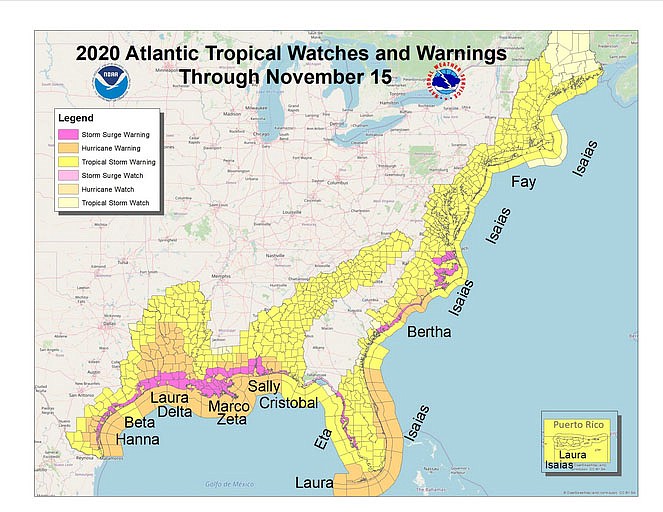Don't write off the world. But don't count out climate change, either.
With Vice President-elect Joe Biden's 2020 victory, the real fight is just beginning in earnest, especially given that we've lost four years and counting (see below) to Donald Trump's destructive time in office.
Consider the energy and environmental headlines of last week:
* The Trump administration, in a late push, moves to sell oil rights in the Arctic National Wildlife Refuge in Alaska. The formal process of selling leases there to oil companies is set to begin just before the Jan. 20 inauguration of Biden and his vice president-elect, Kamala Harris.
* Biden plans to move fast with his '"climate administration." Eager to elevate climate change issues throughout his administration, the president-elect already is drafting orders to reduce planet-warming pollution and is seeking nominees who will embed a climate-fight agenda throughout all agencies and departments in government.
None of this, of course, should be seen as diminishing the work to be done on COVID-19 - at least not in the Biden administration.
Ernest Moniz, a former energy secretary and adviser to Biden's campaign, told The New York Times: "There's no doubt that COVID is the issue of the moment which has to be addressed right out of the box. But we're going to see climate addressed right out of the box as well."
That's good. These are two excellent, important and hopeful agendas - actually, two excellent, important and hopeful voter mandates - for the incoming Biden administration.
Lest anyone think environmental and climate concerns should take a back seat, think again.
From Texas to Maine, all but six coastal counties suffered maximum sustained winds from tropical storms and hurricanes in 2020 alone, with some areas being hit multiple times, according to The Washington Post.
That massive area of coastline - virtually the entirety of the Gulf of Mexico and the Atlantic seaboard - endured a dozen named storms, including the Category 4 Laura that decimated Lake Charles, Louisiana, in late-August. With at least 29 named storms, the 2020 hurricane season has been the busiest season ever recorded, and it's not over.
Experts say climate change is driving our extreme weather - especially extreme weather like slower-moving, rain-drenching hurricanes and storms. This has far-reaching consequences, not the least of which is expense. The National Flood Insurance Program is more than $20 billion in debt. We've yet to see a tally of other storm costs, but we can bet the numbers will be staggering.
Yet Trump's minions not only are putting the pedal to the metal on Arctic drilling leases, they also are hurrying to complete more than two dozen other climate and environmental slow-down actions, and already have brought heavy focus on about a dozen of them, according to the New York University School of Law's Midnight Watch Project, a part of the university's State Energy and Environmental Impact Center.
The director of that center, David J. Hayes, told The Washington Post: "The last gasps of the administration have the potential to either be a speed bump or a potential roadblock for the new administration coming in."
According to the watch list, Trumpites aim to open up for drilling in another vast area in the National Petroleum Reserve-Alaska and to auction off extraction rights on more than 4,100 acres in central California on Dec. 10.
The Department of Interior hopes to formalize a more narrow definition of habitat for endangered species before Biden is sworn in, as well as lower the prohibitions on the incidental killing of migratory birds - a change sought by oil companies whose uncovered oil waste pits attract waterfowl.
Energy officials may exempt some clothes washers and dryers from energy-efficiency requirements and change the definition of a shower head to avoid low-flow requirements.
EPA is finalizing a new rule on how water companies test for lead contamination in drinking water and is loosening air quality standards for both ozone and particulate matter - standards many public health experts say are necessary to prevent premature deaths.
Perhaps most obstructive of all is this: Under Trump, EPA hopes to limit the use of scientific research that does not make public all underlying data. That may sound good on the surface, but it's not. Some of the most important studies documenting the detrimental health impacts of air pollution rely on private medical records, which, under Trump's EPA plan, could no longer be used when crafting regulations. Trump's EPA says this is a matter of "transparency" - a word they only know and use when it fits their dumb-down-common-sense-government agenda.
Another rule the administration is trying to run just under the deadline would prevent future EPA leaders from including certain positive health effects, known as "co-benefits," when analyzing anti-pollution rules going forward.
Andrew Rosenberg, director of the Center for Science and Democracy at the Union of Concerned Scientists, says if the Trump administration gets either of these last two rules done before Biden takes office, it will set up a "really tough battle for the Biden-Harris administration."
Now we know the schedule. And the clock is ticking.
